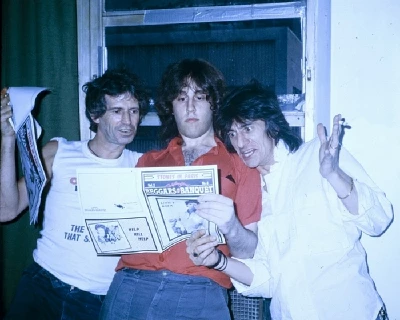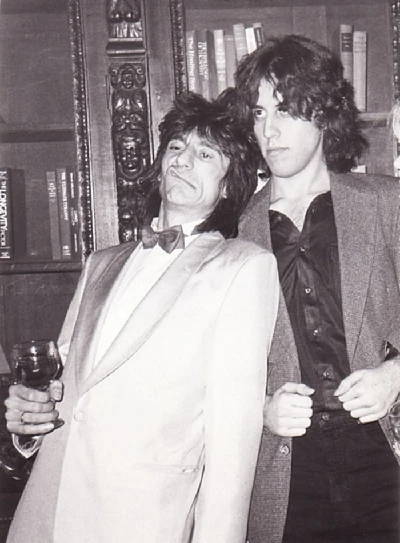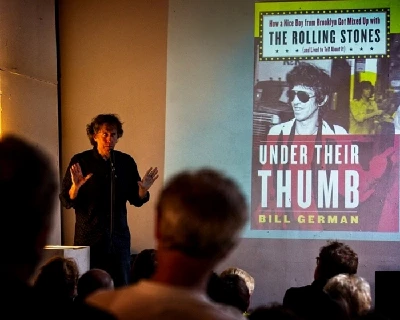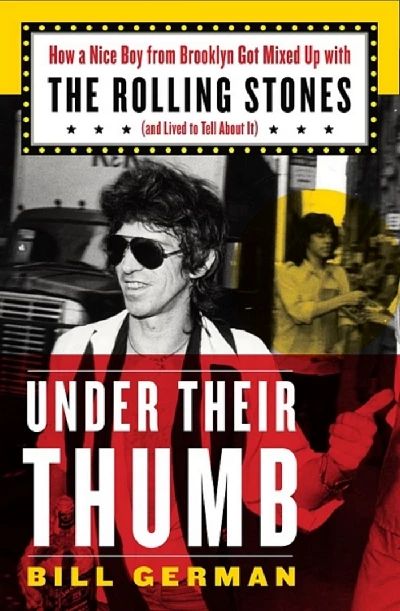published: 6 /
8 /
2019
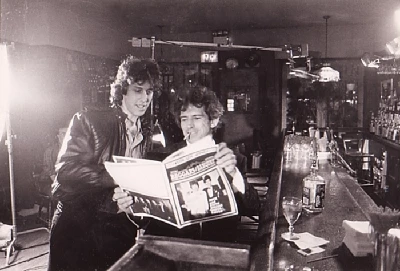
Lisa Torem speaks to Bill German, who spent seventeen years as a journalist during the heyday of the Rolling Stones, during which time his ‘zine, 'Beggars Banquet', became a “must-have” bible for many of the group's fans.
Article
Bill German is the author of ‘Under Their Thumb: How A Nice Boy from Brooklyn Got Mixed Up with the Rolling Stones (and Lived to Tell About It)’, which was published by Villard/Random House in 2009.
German, a sought-after personality and acclaimed author and co-author, who has demonstrated a solid commitment to entertainment journalism, does a fantastic imitation of Keith Richards—those factors alone have kept him on the forefront of the rock and roll map, but curious Stones fans often want to know, how did his journey, with one of the greatest rock bands in the world, begin?
The Brooklyn journalist created the ‘zine ‘Beggars Banquet’ as a teen and kept the publication going for seventeen years, with the purpose of reporting local, Stones sightings, providing interviews with band members, reviewing albums, and printing any other Stones-centric data that super fans wanted to hear.
Ultimately the Stones endorsed the publication, allowing German to enjoy “inner sanctum” status. Over the years, he became privy to private recording sessions and had the opportunity to travel internationally with the band, thus cultivating unique relationships.
German frequently gives talks and exhibits archival material related to his experiences to journalism students and other interested parties. During the week of the rescheduled No Filter tour at Soldiers Field in Chicago, which began on June 21, 2019, German spearheaded related talks in and around the Midwest to rapt audiences.
We met at the trendy artists cooperative Transamoeba Studios located in Chicago’s cutting--edge South Loop. At this one-off author presentation, which was produced by Chicago-based, concert photographer Philamonjaro, German spoke, shared a series of entertaining anecdotes and historical slides, took part in an informal Q& A and was warmly received by Stones fans from all over the United States.
Despite his busy schedule, German agreed to his first interview with Pennyblack, in which he freely discusses why the Stones captured his interest and vice versa, his perception of various band members, future plans and more.
PB: Why do you feel the Stones and their music specifically captured you, body and soul; not some other cool band of the era?
BG: Yes, there may have been other cool bands at the time I discovered the
Stones (1972), but none of them seemed as badass as the Stones in terms of
their wild music (including lyrics I wasn't allowed to repeat in my house as a
ten-year-old!), their raunchy album covers, and their history (concerts that
turned into riots, if not murder scenes!). I knew I could never be as cool as
the Stones but figured I could live that life vicariously by learning
everything about them or - perchance to dream! - getting geographically
closer to them.
PB: As a Brooklyn teenager, you created the Rolling Stones new zine, ‘Beggars Banquet’, with barely more than a mimeograph machine and a raving fan boy’s open heart. You met the Stones on June 26, 1980. What ultimately attracted the Stones to your DIY project?
BG: I think they saw that I had no ulterior motives and wanted nothing from
them materially. I was exactly who I purported myself to be: a 17-year-old
kid with a fanzine, who simply wanted to write about them and know more about
them. They're constantly surrounded by people who wanna take stuff from them,
and there I was as a kid, giving them something (a copy of my ‘zine), instead
of taking or asking them for something (not even an autograph or a handshake
or a photo).
PB: In 1983, the Stones asked you to make the ‘zine “official,” after which time you referred to the project as ‘Volume 2 of Beggars Banquet’. You have suggested that this strongly affected your “editorial freedom.” How so? If you were to face this type of situation again, how would you handle it?
BG: It’s really hard to say how I would approach it today. Obviously, I launched
my ‘zine because I was a fan of theirs, but also because I was an aspiring journalist, taking journalism classes at the time (in high school as well as in college). It’s never a good idea for journalists to get too close to their subjects, of course.
I suppose there's some leeway when it comes to “entertainment journalism”, but there’s still a delicate balance if you’re covering the same people day in and day out. I mean, look at what the news media has been going through these last, few years, still trying to figure out how to cover what’s going on and never being sure when their access might get cut off (credentials/access denied) for merely reporting the truth.
PB: You spent a huge portion of your youth working in some capacity with members of the Stones. Do you have any regrets?
BG: No regrets. The Stones have been celebrities for most of their lives, so
they can be difficult to deal with at times, yet I knew that going in, even
when as a wide-eyed teenager.
PB: After hanging out with them for so many years, can you offer us a thumbnail sketch of each member?
BG: Thumbnail sketches? Well, Mick can be (and I’m quoting Keith here) “a nice
bunch of guys,” charming one day and not so charming the next. (Actually, I’ve seen him change from hour to hour!).
Keith is a warm and generous guy, much more thoughtful than his bad-boy image would indicate. (He and Mick had the same opportunity to take me under their wing: Keith did so voluntarily and enthusiastically, Mick not so much.)
Ronnie is jovial and also pretty warm and generous. The guy you see onstage is the guy in real life.
Bill Wyman was always very friendly to me (even after he left the Stones) and
always seemed like a pretty ethical guy (his current #MeToo issues notwithstanding).
I never really developed a relationship with Charlie, simply because he was (is?) a very introverted guy and eccentrically British (in contrast to me, a neurotic kid from Brooklyn).
PB: Your memoir is currently out of print. Will you republish with a new company? Work on another book? Is there a movie in the works?
BG: Not sure at the moment what's gonna happen with ‘Under Their Thumb’. I
hope it'll be reprinted, either by the original publisher (Random House) or
someone else, perhaps with bonus chapters/photos. But yes, I'm working on
another memoir, which will be the back story to ‘Under Their Thumb’, more about my family (circa 1979-1980), with the Stones making cameo appearances.
I do have a bunch of other ideas that are floating around in my head. And yes, I do think about adapting ‘Under Their Thumb’ into a screenplay.
PB: To write your memoir, you had to retrieve specific memories and facts, which is no small task. Was that challenging? Did you have to rely on other sources?
BG: Being that this was a memoir from my perspective and that I have an
extremely good memory, almost rivaling those people they show on (US investigative programme) ’60 Minutes’, I did not need to conduct interviews for my book or rely on outside sources. I might’ve checked a few back issues of my ‘zine to confirm a few memories, but that's it.
PB: In a February 2009 post, you stated that Bo Diddley had a significant impact on gender relations harkening back to the 1950s when he began employing female instrumentalists. What other sea changes have you observed in your career?
BG: The same things we’ve all seen as consumers (going from LPs to CDs to
MP3s, etc.) plus the resurgence of one-hit wonders who've got nothing to say,
and no social impact other than promoting low-brow celebrity culture.)
PB: On a 2011 blog post, you described your late father, Bernie: “My dad possessed a sense of self-discipline that he passed on to me by example.” He quit smoking cigars cold turkey. Did your father make a strong impact on the way you approached your journalism career?
BG: Maybe not my journalism career, per se, but definitely the way I ran my
business. It takes an incredible amount of responsibility and trustworthiness
to offer people a subscription product ("pay me now and I'll keep sending you
something for the rest of the year") and I think I picked up that sense of
responsibility from him. I mean, I never intended my ‘zine to become a
business in the first place!
PB: God knows; new journalists could use some handy tips. What makes a great anecdote?
BG: What makes a great anecdote? Well, there are some who say "Don't let the
truth get in the way of a good story." I come from the world of journalism, so
I do like the truth and I sincerely feel that it is often stranger than fiction. For me
personally, a good anecdote tells the audience something they didn’t know before
and gets them to react (laugh, cry, or just a simple “Wow”).
PB: You collaborated on (autobiography / art work collection) ‘The Works’ with Ron Wood? Did you divide the work evenly or according to skill level?
BG: Divide the work? You gotta be kiddin’ me! Ghostwriters/co-authors do
all the work (or at least 80%), but the celebrities get all the credit and
most of (almost all of) the dough!
PB: You must have some favorite Stones songs. What other bands are you listening to these days?
BG: I don’t know if I have a favorite Stones song. Probably depends on my
mood. But because their stuff is so etched in my brain, I usually listen to
other artists. I love all the old blues artists that the Stones turned me on
to, Muddy Waters, Howlin’ Wolf, Otis Redding, but also some of the old,
white guys I’ve discovered on my own, like Bob Dylan, Tom Waits, Leonard
Cohen, Ian Hunter.
PB: Thank you.
Lisa Torem would like to extend special thanks to concert photographer Philamonjaro, photographer Paul Crisanti and Transamoeba Studios. The lower photograph was taken by Paul Crisanti.
Band Links:-
http://www.billgerman.com/
https://www.facebook.com/bill.german.7
Play in YouTube:-
Picture Gallery:-
